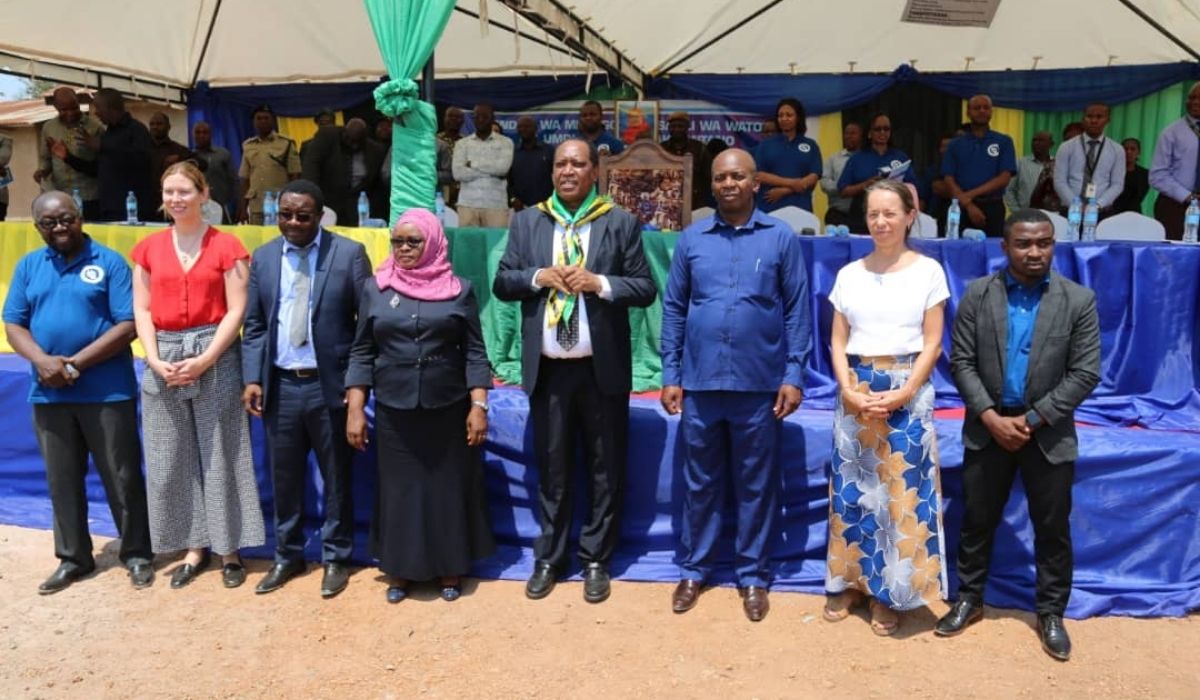Katavi and Rukwa regions launched the implementation of the gender-responsive simplified birth registration system today. In the next two months, more than 400,000 under-five children in the two regions are expected to receive a birth certificate.
The launch, held today at Katavi MC, was attended by Hon. Minister for Constitutional and Legal Affairs Prof. Palamagamba Kabudi and other guests. The goal of the programme is to establish a system for registering all new births and all under-five children in the two regions.
The system makes birth registration more accessible to the community. Before this system was introduced, registration could only take place at the district headquarter town, now registration points are established at health facilities, which provide reproductive and child health services, and at the community ward executive offices in line with the government policy of decentralization through devolution.
Declaring health facilities and ward executive offices registration points will enable parents in these two regions to easily access more than 478 registration points set up compared to registration points at present. Moreover, there will be close to 1,021 trained Registration Assistants to support the registration process in 9 local councils in Katavi and Rukwa regions.
The Government has waived fees for registration under this programme and the first copy of the certificate is given free of charge. The programme introduces a ‘one step, one visit’ process and adapts an innovative way of data collection. Through the use of SMS, data will be instantly transferred and uploaded, facilitating a real-time tracking of progress.
The decentralized system significantly accelerates birth registration in Tanzania Mainland, after years of stagnation.
“We are transforming the system to make it easier for children and their families to access the entitlement of a birth certificate. Now parents can receive birth certificates from the designated health facilities or through the ward executive offices. The system has helped thousands of children in the regions where the decentralized system is in operation and we have a plan to replicate this throughout Tanzania Mainland in the shortest possible time. We are committed to ensuring that no child is left behind and, therefore, have taken extra steps focusing more on gender and equity starting with Katavi and Rukwa regions. The Government duly recognizes the contribution of UNICEF, the Government of Canada and Tigo for their commitments to this cause.”
Emmy Hudson, Acting Administrator General and Chief Executive Officer, Registration, Insolvency and Trusteeship Agency (RITA)
The Government is implementing this programme since 2013 in partnership with UNICEF, Tigo and funding from the Canadian Government. Today this initiative is being rolled out in Katavi and Rukwa, joining Arusha, Manyara, Kilimanjaro, Tanga, Ruvuma, Singida, Dodoma, Mara, Simiyu, Lindi, Mtwara, Geita, Shinyanga, Mbeya, Songwe, Mwanza, Iringa, Njombe, Morogoro and Pwani which already have the simplified birth registration system in place through which more than seven million under-five children have been reached. The new system has resulted in an overall increase of certification of under-fives in these regions from less than 10 per cent to more than 80 per cent. The system has also helped in improving the certification rate for Tanzania Mainland from less than 13 per cent to more than 60 per cent in a little over eight years.
Right from the inception of the design of the innovative birth registration system, UNICEF has been working closely with the Government in implementing it seamlessly one region at a time with the aim of covering the entire country by 2023.
“Every child has the right to an identity. A birth certificate is a vital record that documents the birth of a child. The right to be registered immediately after birth, to have a name and acquire a nationality is every child’s right, enshrined in the Convention on the Rights of the Child – which is now over 30 years old. The simplified birth registration system is reversing the low level of birth registration which means that millions of children under-five who are “invisible” in the nation’s records, will now be ‘visible’. This will help more Tanzanian children to claim their rights and be protected.”
Maud Droogleever Fortuijn, UNICEF Chief Child protection in Tanzania
“I am pleased to witness the implementation of the new birth registration system in the Katavi and Rukwa regions. Canada is proud to be providing over CAD30 million in support of Tanzania’s innovative under-five birth registration system. The collaboration between the Government of Tanzania, TIGO, UNICEF and Canada on this project has resulted in over 7 million children being registered since 2013. Under its Feminist International Assistance Policy, Canada prioritizes such critical steps to ensure children, especially young women and girls, can access health services, education, and other key rights and protection.”
Julia Hamel, Inclusive Governance Sector Lead and Second Secretary (Development), High Commission of Canada in Tanzania
The funding has facilitated the Government of Tanzania to establish a sustainable model of birth registration aimed at reaching more than seven million girls and boys under the age of five in 22 regions. The funding will significantly contribute to the development of an efficient Civil Registration and Vital Statistics System in the country.
Tigo is supporting the initiative through innovative mobile technology, which ensures that birth registration data is uploaded and sent to a central database in real time. Tigo is also using its media platforms in raising awareness about the importance of birth registration in Tanzania. In addition, Tigo is also providing 1,750 smartphones, worth TZS 148 million, routers and free SMS to support the initiative.
“As a telecom that champions digital lifestyle in Tanzania, we are supporting this noble initiative in partnership with RITA, Global Affairs Canada and UNICEF, and we are committed to improve access of birth certificates for the under-five children in Tanzania. Furthermore, this partnership underscores our commitment to empower our communities through the use of digital tools.”
Abbas Abdurahamani, Southern Zone Director, Representing Tigo
Birth registration is critical since children’s access to all social services stem from birth certification. Moreover, for adults to acquire other forms of identification such as voters ID, driver’s license, passport and national ID, requires a birth certificate. Today, SIM card registration cannot be performed without one of the IDs mentioned above. The new birth registration system has bridged the rural-urban divide, improving access to the most marginalized communities to register their children, and continues to tackle gender-related barriers relating to birth registration. It addresses the core issues of ‘accessibility’ and ‘affordability’ which has been a major barrier in the birth registration system in Tanzania.











